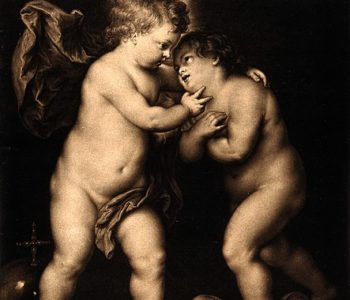
Wellcome Images
It is one of my favorite observations: “Those who fail to learn from history are doomed to repeat it.”
We’ve all heard this one, or at least some version of it. It is a statement that underscores the cyclical nature of society and implores those living within that society to think critically about the decisions they make during times of war and peace. At the heart of the missive is an urge not to make a hasty call in the heat of the moment, but to take a long view and determine what is ultimately best for mankind.
The known origins of this line date back to the 1700’s when Irish statesman and orator Edmund Burke said, “Those who don’t know history are destined to repeat it.” American philosopher, poet, novelist and essayist George Santayana adapted the warning in 1913 to, “Those who cannot remember the past are condemned to repeat it.” And when Winston Churchill offered his take on the observation (above) in a 1948 speech to the House of Commons, he tightened the lingo bringing Santayana’s 16 syllables down to 15, but adding two words to Burke’s original statement. (I’m pretty sure the late George Carlin would have a field day with that information.)
But is it possible that the line’s lineage is much older than that? With all due respect to Churchill and the other two men, I can’t help wondering if the idea behind the statement didn’t originate with Jesus himself. Although he doesn’t use the exact words, in today’s Gospel, He warns his disciples that when people do not learn from their actions, they tend to make the same mistakes over and over again. Despite confronting John the Baptist and learning that he might be the prophet sent to herald the coming Messiah, the powers that be felt threatened by his presence and ultimately killed him.
Jesus sees which way the wind is blowing and knows that if John couldn’t get a fair shake, there is no way He is going to come out of this unscathed. John was killed for pouring water on people’s heads and screaming, “Repent!” at the top of his lungs…imagine what’s going to happen when they see Jesus healing the sick, feeding the multitudes and bringing the dead to life. It isn’t going to end well. Despite waiting for the Messiah for thousands of years, they will get it wrong because they failed to read the signs and they failed to learn from the past.
However, some did recognize that a new day was dawning and that is a historical lesson as well. The fact that we celebrate advent at all shows that we welcome the coming of the Christ Child and all that He brought into the world. We commemorate His place in history and the spiritual teachings that continue to inspire 2,000-plus years later. We take His rubric as a standard for our own lives and measure our decisions up against it in everything we do. Through advent we symbolically repeat this glorious aspect of history in order to better understand the life lessons Jesus came to offer, but we are not doomed. Rather, we are renewed.
Today’s readings for Mass: SIR 48:1-4, 9-11; PS 80: 2AC and 3B, 15-16, 18-19; MT 17: 9A, 10-13.
